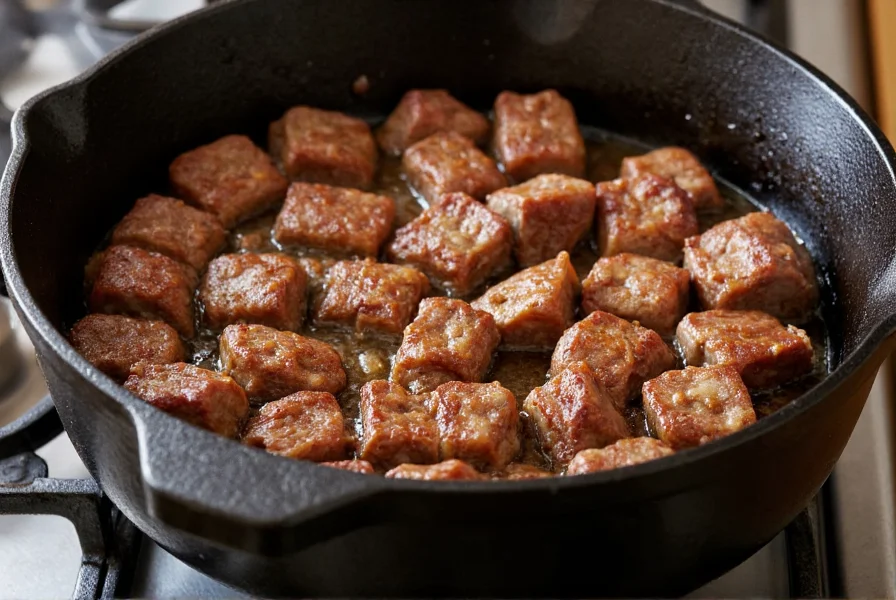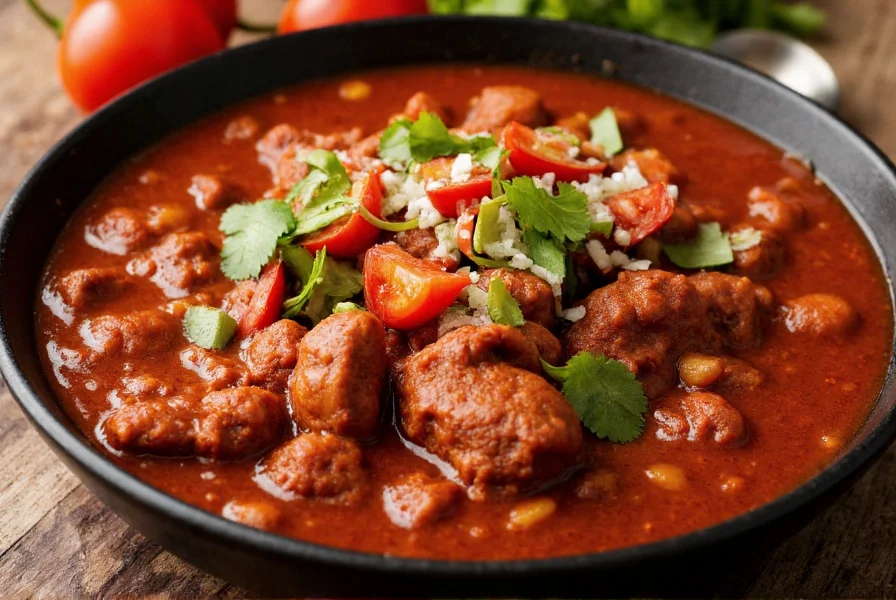When crafting the perfect pot of chili, the choice of meat significantly impacts both texture and flavor development. Stew meat—typically cut from chuck, round, or brisket—offers distinct advantages over traditional ground beef. These tougher cuts contain collagen that transforms into gelatin during slow cooking, naturally thickening the chili while adding luxurious mouthfeel. The cubed format also allows for more controlled browning, developing deeper Maillard reaction flavors compared to ground meat.
Why Stew Meat Outperforms Other Cuts in Chili
Understanding meat science explains why stew meat excels in slow-cooked dishes. The intramuscular fat distribution in chuck roast (a common stew meat cut) provides consistent marbling that melts gradually, basting the meat from within. This contrasts with leaner cuts that often dry out during extended simmering. When selecting stew meat, look for pieces with visible marbling and avoid pre-cut 'stew meat' packages that often contain inconsistent sizes—uniform 1-inch cubes ensure even cooking.
| Meat Type | Cooking Time | Texture Result | Flavor Contribution |
|---|---|---|---|
| Stew Meat (chuck) | 2-3 hours | Fork-tender, holds shape | Rich beefiness, complex notes |
| Ground Beef | 30-45 minutes | Crumbly, blends into broth | One-dimensional beef flavor |
| Short Ribs | 3+ hours | Falls apart | Intense richness, gelatinous |
Classic Stew Meat Chili Recipe
This recipe leverages the unique properties of stew meat to create layered flavors. The key is proper browning in batches—overcrowding the pan steams the meat rather than searing it, sacrificing crucial flavor development.

Ingredients
- 2 lbs beef chuck stew meat, cut into 1-inch cubes
- 3 tbsp vegetable oil
- 1 large yellow onion, diced
- 4 garlic cloves, minced
- 2 tbsp chili powder
- 1 tbsp cumin
- 2 tsp smoked paprika
- 1 (28-oz) can crushed tomatoes
- 2 cups beef broth
- 1 (15-oz) can kidney beans, drained
- 1 tbsp Worcestershire sauce
- Salt and black pepper to taste
Step-by-Step Instructions
- Pat stew meat dry with paper towels and season generously with salt and pepper
- Heat 2 tbsp oil in heavy Dutch oven over medium-high heat until shimmering
- Sear meat in single layer (work in batches) until deeply browned on all sides
- Remove meat and sauté onions until translucent (5 minutes)
- Add garlic and spices, cooking until fragrant (1 minute)
- Return meat to pot with tomatoes, broth, and Worcestershire sauce
- Simmer covered on low heat for 2 hours, stirring occasionally
- Add beans and continue simmering 30 minutes until meat is fork-tender
- Adjust seasoning and skim excess fat before serving

Pro Tips for Perfect Stew Meat Chili
Achieving restaurant-quality results requires attention to specific details when working with cubed meat. First, never skip the browning step—this creates flavor compounds essential for depth. Second, maintain a gentle simmer rather than vigorous boil; stew meat requires time for collagen breakdown but will become stringy if cooked too aggressively. Third, consider adding a small amount of acid (like 1 tbsp apple cider vinegar) in the last 15 minutes to brighten flavors and tenderize the meat further.
For optimal texture, cut your own stew meat from a whole chuck roast rather than purchasing pre-cut packages. This ensures uniform size and better quality control. When browning, resist the urge to move the meat too soon—proper searing requires patience as the meat naturally releases from the pan when ready to flip.
Avoiding Common Stew Meat Chili Mistakes
Many home cooks encounter issues with cubed meat chili. The most frequent problem is tough meat, which occurs when the collagen hasn't fully converted to gelatin—this requires sufficient cooking time at proper temperature (190-205°F). Another common error is adding salt too early in the cooking process, which can draw out moisture and inhibit browning. Instead, season in stages: lightly before searing, then adjust at the end.
Don't overcrowd the pot during simmering—stew meat needs space to cook properly. If your chili seems too thin after cooking, remove some meat and beans, then reduce the liquid by simmering uncovered before returning the solids. For deeper flavor complexity, try adding a small piece of dried mushroom or a square of dark chocolate during the last hour of cooking.
Serving and Storage Recommendations
Stew meat chili actually improves overnight as flavors meld. Store in airtight containers for up to 4 days in the refrigerator or freeze for up to 3 months. When reheating, add a splash of broth to restore moisture. For serving, traditional toppings like sour cream and shredded cheese complement the rich beefiness, while a sprinkle of fresh cilantro adds brightness. Consider serving with cornbread to soak up the flavorful broth.
Frequently Asked Questions
Can I use frozen stew meat for chili?
Yes, but thaw completely before cooking. Frozen meat lowers the pan temperature during browning, preventing proper sear. For best results, thaw overnight in the refrigerator and pat dry thoroughly before seasoning and searing.
Why is my stew meat still tough after 2 hours?
Insufficient cooking time or temperature is usually the cause. Stew meat requires 2-3 hours at a gentle simmer (190-205°F) for collagen to convert to gelatin. Ensure your pot maintains a consistent low temperature and avoid boiling, which makes meat tough. Check with a fork—it should slide in with no resistance.
How do I prevent stew meat from drying out in chili?
Maintain proper liquid levels throughout cooking—meat should be mostly submerged. Avoid excessive evaporation by using a tight-fitting lid. The natural fat in chuck roast protects against drying, but never cook at a rapid boil. Adding acidic elements like tomatoes early helps retain moisture during long cooking times.
What's the best cut of stew meat for chili?
Beef chuck is ideal due to its marbling and connective tissue. Brisket works well but requires longer cooking. Avoid lean cuts like round, which can become dry. Look for pieces with visible marbling—this fat renders during cooking, basting the meat internally and creating richer flavor.
Can I make stew meat chili in a slow cooker?
Yes, but always brown the meat first in a skillet. Slow cookers don't reach high enough temperatures for proper Maillard reaction. After browning, transfer everything to the slow cooker and cook on low for 6-8 hours. This method yields exceptionally tender meat while developing deep flavors.











 浙公网安备
33010002000092号
浙公网安备
33010002000092号 浙B2-20120091-4
浙B2-20120091-4